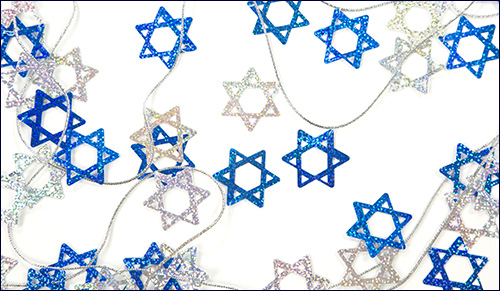 Passover’s Message of Hope in the Aftermath of Oct. 7
Passover’s Message of Hope in the Aftermath of Oct. 7


5 min read
Why did Judaism pose such a great threat to ancient Greece?
I grew up in a very Jewish Miami suburb where Christmas was never something we were envious of. Christmas lights on palm trees just don’t cut it!
Now I live with my wife and three kids in Colorado which at this time of year resembles one of those Christmas specials you see on TV with perfect, freshly-fallen powdery snow. Wherever you go, homes and streets are beautifully decorated for the holiday season and glowing with brightly lit trees.
We were driving to a Hanukkah gathering last year when my 4-year-old son asked me what the lights were for. I considered making up a story about the lights being special for Hanukkah, when I stopped in my tracks and realized the irony.
Christmas decorations stand opposite menorahs flickering in the windows of Jewish homes.
Without a doubt, the popularity of Hanukkah among American Jews is based on its coinciding with the holiday season. But Hanukkah is not "the Jewish Christmas." The irony is that Hanukkah represents the victory of spirituality over materialism and over the obsession with all that glitters. Not only were those neighborhood decorations not Hanukkah lights, they stood for the exact opposite of the candles that flicker in the windows of Jewish homes.
It is said that every Jewish holiday can be summed up as: “They tried to kill us, we won, let’s eat!” Yet this is not true with Hanukkah. Unlike Pharaoh in Egypt and Haman of the Purim story, the Syrian Greeks during the second Temple period did not want to eradicate the Jews. They wanted to eradicate Judaism.
Why did Judaism pose such a threat to ancient Greece? Why could they tolerate us alive, but not our way of life?
The answer lies in a basic philosophic dispute. Greek values stem from an obsession with the external facade of beauty. Rabbi Yehuda HaLevi warned: "Beware of the wisdom of Greece, for it has no fruit, only flowers." Fruit gives sustenance, while flowers offer nothing but aesthetic beauty. Fruit has nutritional purpose; flowers have temporal superficiality.
Greek society valued the external, superficial. They believed that only sensual experiences are real. That reality is limited to what we can taste and touch, or what our minds can grasp.
This is the antithesis of Torah thought, which believes there is much more beneath the surface - infinite layers of depth beyond what the eye sees. This totally opposes the worldview of ancient Greece.
What then, is real beauty?
Beauty is harmony – the amalgamation of two opposites coming together in complement and coexistence. Blending two similar things creates a larger entity; only through dissimilar parts can a harmonious synthesis occur.
Symphonic beauty is when different instruments play different notes – all together.
The striking beauty of a mountain range is a result of the majestic heights of the mountaintops in relation to the valleys below and the blue sky above. A chord in music is a result of various notes played simultaneously. A symphony's beauty is the incorporation of different instruments playing different notes – all together.
Ultimate beauty, therefore, is defined as polar opposites uniting and complementing each other. Which raises the question: What two things are most distant from one another?
Physicality and spirituality.
And when they coexist harmoniously, that is true beauty.
By contrast, when physicality contradicts or overshadows spirituality, the result is ugliness.
The Talmud says that 10 measures of beauty descended on the world and Jerusalem took nine. Jerusalem is known as the city of connection, where Heaven and Earth join. The Holy Temple in Jerusalem was a beautiful edifice in the physical world that embodied the spiritual, and from which all beauty emanates.
That is why the Greeks stormed the Temple, defiled it, and offered pigs on its altar.
The Book of Proverbs states an apparent contradiction: "Grace is false, and beauty is futile." This seems to indicate that physical beauty is not praiseworthy. On the other hand, the Torah goes out of its way to describe the matriarchs' beauty, which implies that beauty is indeed praiseworthy.
The answer is that when the physical compliments the spiritual – when outer beauty reflects the deeper inner beauty of ethics and values – that is ultimate beauty. When the physical conceals the spiritual, however, the result is false and futile. (The Hebrew word for ugly, michu'or, comes for the same word meaning cloudy or opaque.)
Real beauty should bring out the natural essence, not cover it up.
Imagine going to an expensive steakhouse and asking for ketchup. A gourmet would be appalled. A good steak needs just salt and pepper to bring out the natural flavor; ketchup covers up the taste. So too, real beauty should bring out the natural essence, not cover it up.
When the Maccabees reclaimed the Temple, not only was there no pure oil accessible, but many of the Temple vessels were ransacked, including the Menorah. When the Maccabees finally found a small flask of oil, they made a make-shift menorah out of spears, and lit the oil which should have lasted only one day. God made an incredible miracle and the oil lasted for eight days.
Why did the miracle come about through oil? Why didn't God miraculously create a Menorah?
Hanukkah is about remembering the hidden essence, the beauty based on what’s inside, not the external facade. Thus the miracle happened with the oil, not the Menorah itself. There was plenty of oil around, but they were missing spiritually pure oil.
Every moment of life contains these two aspects: physical and spiritual. Deciding which to emphasize at each moment is a lifelong, moment-by-moment challenge. Performing the miracle with oil shows us the emphasis on the spiritual side.
Yes, the physical is important and necessary. But it is not “it.”
